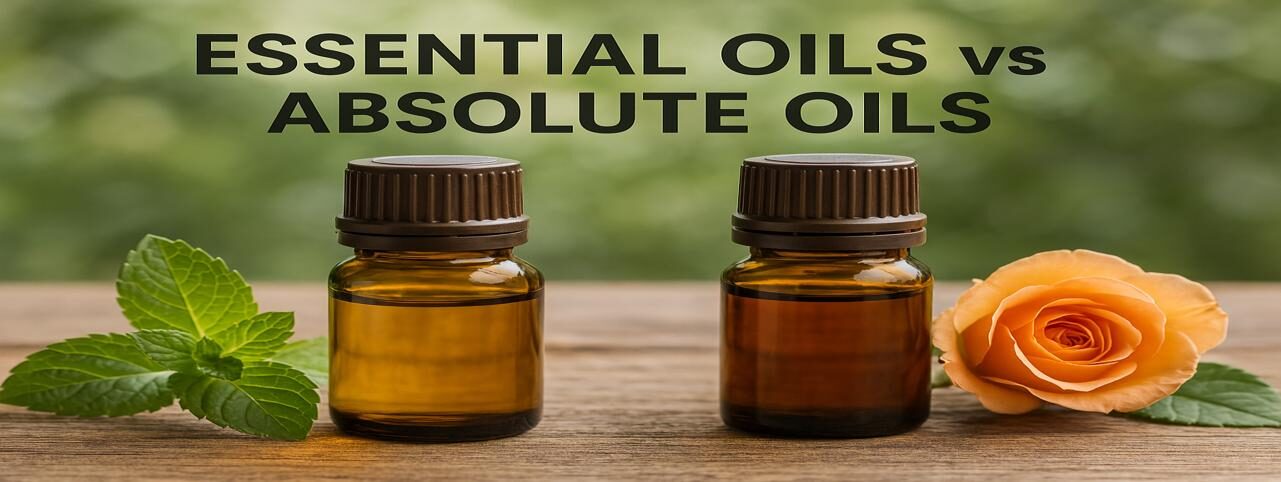Error: Contact form not found.

Have you ever browsed a store and come across essential oils and absolutes, curious about how they differ? Many of us use essential oils and absolutes without really thinking about how they are different- or if they even are. Moreover, when deciding between essential oil and absolute oil, some people will suggest choosing essential oil, while others will recommend absolute oil.
The truth is, the choice depends on your personal needs and preferences. However, it is important to do some research before using either of them. In this blog, we will discuss absolute oil vs essential oil. So, let us begin!
Absolutes oils are plant-based extracts that are commonly used in perfumes, aromatherapy and for various health purposes. They are made using chemical solvents to extract the oils from plants, with most of the solvent being removed later, leaving only a small trace in the final product.
Some popular types of absolutes oils include rose, tuberose, jasmine and lavender. Here are some uses of absolute oils:
Essential oils are fragrant liquids extracted from plants using methods like cold-pressing or steam distillation. These oils come from different parts of the plant, such as seeds, leaves, bark, flowers and even peels. Their unique scents and natural properties make them helpful for improving mental health and addressing other health issues. Here are some uses of essential oils:
The way oils are extracted is a key difference between absolutes and essential oils. Even if both oils come from the one same plant or part of the plant, their properties can vary based on the extraction method. Let us take a closer look at these two extraction methods:
Steam distillation is a widely used method for obtaining essential oils from plant roots, stems, flowers and leaves. This straightforward technique has been in use for centuries to extract fragrant oils. During the process, the plant material is placed in a container with water.
Heat is applied, which causes the plant to break down and release its aromatic compounds as steam. The steam is then cooled and condensed, allowing essential oil to separate from the water. The final oil is collected, bottled and ready to be used. This process is commonly used to obtain majority essential oils.
Heat is not used for delicate plants such as jasmine because it could damage them. Instead, the plant material is soaked in a solvent, which helps release the plant’s aromatic compounds. Once the solvent is eliminated, what is left is a strong and concentrated mixture called an absolute. These oils are usually more intense in scent and more similar to the plant’s natural fragrance.
Suggested Read: A Comprehensive Guide to Essential Oil Extraction Methods
Essential oils and absolutes from the same plant can have similar to very different characteristics and chemical compositions. Steam distillation creates essential oils with lighter molecules that can easily evaporate when exposed to air.
In contrast, solvent extraction results in oils with larger molecules, which is why absolutes tend to be thicker than essential oils. Because of this, some natural molecules in plants are too big to be captured by steam distillation, but they can be found in absolute oils aromatherapy. With this in mind, here are the key differences between the absolutes and their essential oil versions:
Osmanthus flowers can produce essential oil, but it is not commercially available. GC/MS tests show that Osmanthus essential oil differs from the absolute in fragrance compounds. It has a floral, fruity, tea-like scent with black pepper notes and is commonly used in cleansers, room sprays, serums, moisturizers and perfumes.
Rose essential oil has a greener and earthier scent, while rose absolute is sweeter and more floral. While rose essential oil is great for skincare, rose absolute is ideal for boosting mood, making perfumes and relieving stress or pain. Both come from Rosa Damascena.
Unlike rose absolute, jasmine absolute cannot be made using steam distillation. That is because jasmine flowers do not produce oil that way. Instead, solvent extraction is used. Some companies label this “jasmine essential oil,” but it should be called an absolute. Jasmine oil is known for its sweet and floral aroma and skin benefits.
Tobacco absolute is preferred over tobacco essential oil for its better quality and aroma. While both share similar chemistry, their component levels differ. Tobacco absolute is commonly used in perfumes, curbing cravings, boosting confidence and repelling insects.
Consistency, scent and color are some key factors that help tell the difference between essential oils and absolute oils. Absolute oils aromatherapy are thicker, usually appear amber in color, and have a stronger scent, unlike essential oils. Because of their high concentration, absolutes should never be applied directly to the skin.
If we talk about essential oils, they possess soothing qualities that help with issues like anxiety, stress and depression. In fact, ancient texts from Greece, India and China mention the use of essential oils for various health problems.
Today, their widespread use in haircare and skincare has created a significant demand in the natural beauty industry. While essential oils are great for various DIY projects, topical uses and aromatherapy, absolutes are better suited for diffusing or use in DIY projects.
We hope you now have a clear understanding of the difference between essential oils and absolute oils aromatherapy. Remember, it is always a good idea to consult an expert before using either type of oil to ensure safety.
Sivaroma is a leading essential oil manufacturer that offers both high-quality essential and absolute oils to businesses. Contact us today to explore our premium oil collection and enhance your products with the finest natural ingredients.